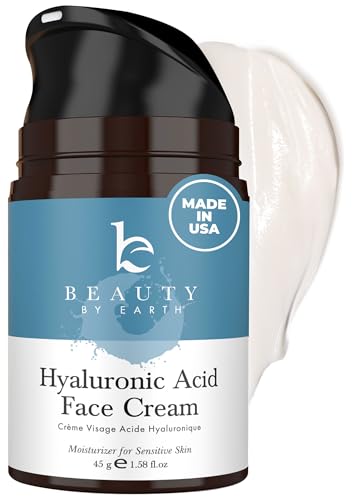
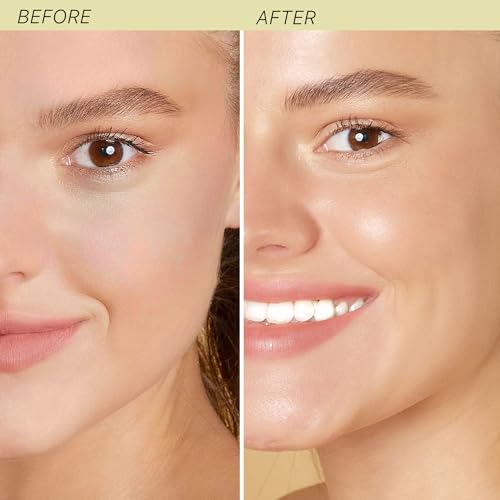
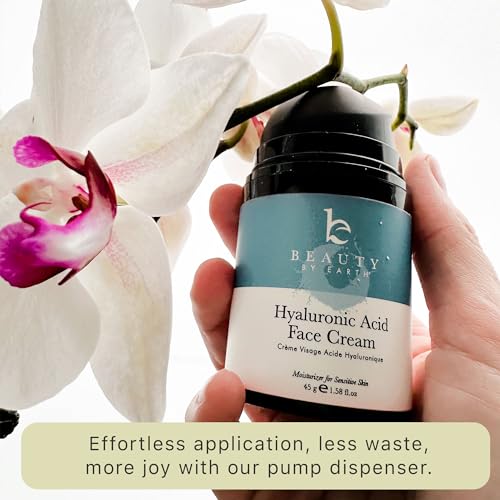
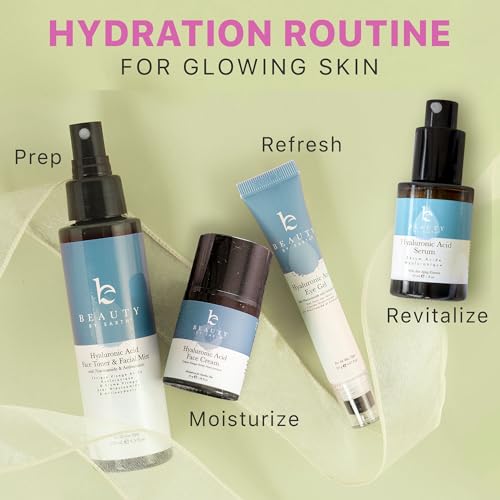
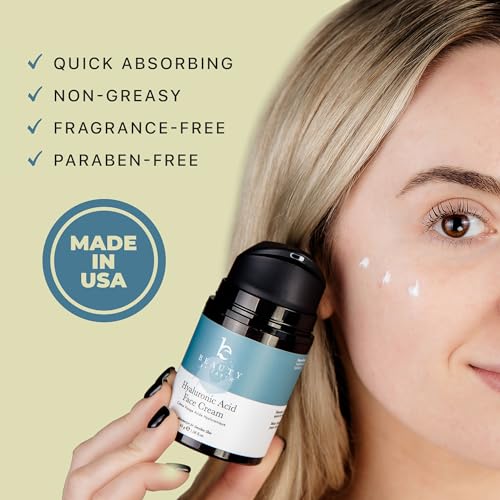
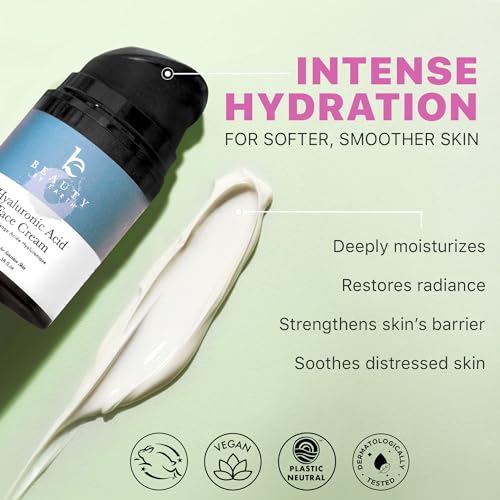
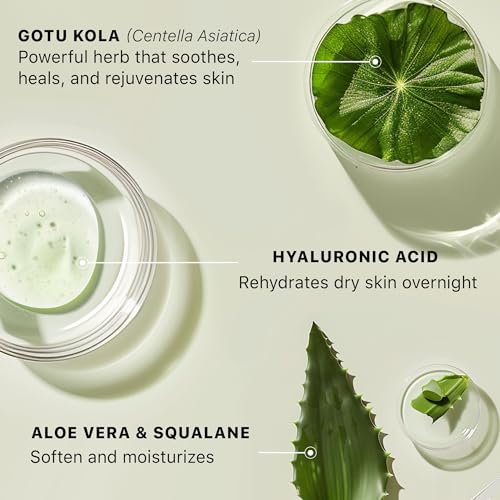
Hyaluronic Acid Face Moisturizer - Deep Hydration, Anti-Aging, Organic Ingredients - 4oz


Leuconostoc/Radish Root Ferment Filtrate
Low RiskLeuconostoc/radish root ferment filtrate is a natural fermentation product derived from radish roots, commonly used in skincare for its potential preservative properties and skin-conditioning benefits. It functions by harnessing the metabolic activity of Leuconostoc bacteria to provide a source of beneficial compounds.
Sustai Insights
This ingredient offers functional benefits, primarily as a preservative and skin-conditioning agent, while being biodegradable and sustainably sourced. Health risks are generally low, with no significant concerns regarding carcinogenicity or allergies, though contamination concerns exist. Environmentally, it poses minimal risks, categorized as low overall risk based on current scientific consensus. Safe usage practices are advised, and alternatives may include other natural preservatives like tocopherol or rosemary extract.
Tocopherol, D Alpha
Low RiskTocopherol, specifically d-alpha tocopherol, is a naturally occurring form of Vitamin E. It is commonly used in cosmetic and personal care products primarily for its antioxidant properties, helping to protect formulations from oxidation and extend shelf life.
Sustai Insights
D-alpha tocopherol provides effective antioxidant benefits, contributing to product stability. It is sustainably sourced and generally regarded as safe, with low concerns regarding carcinogenicity, allergies, and reproductive toxicity. However, there are minor concerns about endocrine disruption. Regulatory bodies have not imposed significant restrictions, indicating low overall risk. Recommended usage practices include adhering to established safe concentration thresholds. Alternatives, such as other forms of Vitamin E or plant-based antioxidants, may also be considered.
Cetearyl Olivate
Low RiskCetearyl olivate is composed of cetearyl alcohol and the fatty acids derived from olive oil. It is primarily used as an emulsifier and skin-conditioning agent in cosmetic formulations, helping to stabilize and enhance the texture of creams and lotions.
Sustai Insights
Cetearyl olivate serves as an effective emulsifier, contributing to product stability and texture. It is derived from olive oil, making it a sustainable choice due to its biodegradable nature. Health concerns are low, with minimal risks for irritation and allergies. Regulatory status is favorable, with no significant warnings. Environmental risks are also low, indicating it does not pose substantial hazards. Overall, the ingredient presents a low risk profile, making it a safe option in cosmetic products.
Aloe Barbadensis (Aloe Vera) Leaf Extract
Low RiskAloe vera leaf extract is produced from the succulent leaves of the Aloe barbadensis plant. It is commonly used in cosmetic formulations for its moisturizing and soothing properties, making it a popular ingredient in skincare and personal care products.
Sustai Insights
Aloe vera leaf extract offers several functional benefits, including hydration and skin soothing effects, which are well-supported by scientific literature. It is considered to have a low risk for common health concerns such as carcinogenicity, allergies, or reproductive toxicity. Environmentally, it poses minimal risks, with no significant pollutant potential or bioaccumulation reported. Regulatory bodies have not imposed major restrictions, although verified products should not contain certain contaminants. Overall, this ingredient is assessed as low risk, with safe usage practices and the availability of alternative soothing agents if desired.
Cetyl Alcohol
Low RiskCetyl alcohol is a long-chain organic alcohol commonly used in cosmetic formulations. It serves as an emollient, emulsifier, and thickening agent, enhancing the texture and stability of products. Cetyl alcohol is derived from natural sources, such as coconut or palm oil, and is often included in creams, lotions, and hair conditioners.
Sustai Insights
Cetyl alcohol offers functional benefits as an emollient and emulsifier, improving product texture and stability. It is biodegradable and sourced from renewable materials, contributing to sustainability. Health risks are minimal, with low concerns for carcinogenicity, allergies, or reproductive toxicity. Environmental impact is also low, with no significant pollutant or bioaccumulation potential. Regulatory bodies have not placed restrictions on its use, indicating a favorable safety profile. Overall, cetyl alcohol is assessed as low risk, and safe usage practices include ensuring proper formulation concentrations.
Hyaluronic Acid
Low RiskHyaluronic acid is a natural polysaccharide found in connective tissues, skin, and cartilage, primarily serving as a moisture-retaining agent in cosmetic products. Its primary function is to provide hydration and improve skin elasticity, making it a common ingredient in moisturizers and serums.
Sustai Insights
Hyaluronic acid offers significant functional benefits, such as effective hydration and skin plumping, while being biodegradable and generally recognized as safe by regulatory bodies. Health risks are minimal, with low concerns regarding carcinogenicity, allergies, or reproductive toxicity. Environmental risks are also low, as it is not considered a pollutant or bioaccumulative. Regulatory bodies have not issued major advisories against its use, resulting in an overall low-risk assessment. For safe usage, it is recommended to apply in appropriate concentrations. Alternatives include glycerin or aloe vera, which also provide hydration.
Carthamus Tinctorius (Safflower) Seed Oil
Low RiskCarthamus tinctorius (safflower) seed oil is derived from the seeds of the safflower plant. It is primarily used in cosmetic formulations for its emollient properties, helping to moisturize and soften the skin. The oil is rich in unsaturated fatty acids and is often employed in skin care products for its potential benefits to skin health.
Sustai Insights
Safflower seed oil offers functional benefits as a moisturizer and emollient, contributing to skin hydration without significant irritation. It is generally recognized as low risk concerning health impacts, with minimal concerns over carcinogenicity, allergies, and reproductive toxicity. Environmentally, it poses low risks, being non-bioaccumulative and not a significant pollutant. Regulatory bodies do not impose restrictions on its use, underscoring its safety profile. While there are no widely recognized safer alternatives, users should ensure proper application to mitigate any potential skin irritation. Overall, this ingredient is assessed as low risk.
Simmondsia Chinensis (Jojoba)
Low RiskSimmondsia chinensis, commonly known as jojoba, is an oil derived from the seeds of the jojoba plant. It is commonly used in cosmetic formulations for its moisturizing properties, acting as an emollient and skin conditioning agent.
Sustai Insights
Jojoba oil offers functional benefits such as effective skin moisturization and is biodegradable, with sustainable sourcing practices. Health risks are low, with minimal concerns regarding carcinogenicity, allergies, and reproductive toxicity. Environmental impact is negligible, with no pollutant or bioaccumulation potential. Regulatory status is favorable with no significant restrictions noted. Overall, it is assessed as low risk, and safe usage practices should be maintained. Alternatives include other plant-derived oils like argan or almond oil, which may provide similar benefits.
Vegetarian Glycerin
Low RiskVegetarian glycerin, also known as glycerol, is a colorless, odorless, and viscous liquid derived from plant sources. It is primarily used as a humectant, solvent, and emollient in various personal care products, helping to retain moisture and improve texture.
Sustai Insights
Vegetarian glycerin offers functional benefits as an effective humectant, promoting hydration and skin smoothness. It is biodegradable and typically sustainably sourced. Health risks associated with glycerin are low, with no significant concerns for carcinogenicity, allergens, or reproductive toxicity. Environmental risks are minimal, and it is not subject to major regulatory warnings. Overall, the risk level for this ingredient is low, making it a safe choice in formulations. Safe usage practices include ensuring proper concentrations in products, and alternatives such as propylene glycol exist but may have differing properties.
Helianthus Annuus (Sunflower) Seed
Low RiskHelianthus annuus (sunflower) seed is derived from the seeds of the sunflower plant and is commonly used in various cosmetic and personal care products. It serves primarily as an emollient and skin conditioning agent, providing moisture and enhancing the texture of formulations.
Sustai Insights
Helianthus annuus (sunflower) seed offers functional benefits, including skin conditioning and moisturizing properties, while being sustainably sourced and biodegradable. Health risks are minimal, with low concerns for carcinogenicity, allergies, and reproductive toxicity. Environmentally, it presents low risks of pollution or bioaccumulation. Regulatory assessments indicate no current restrictions. Overall, it is considered a low-risk ingredient, and safe usage practices should be maintained. Alternative ingredients may include other plant-based oils, but the sunflower seed oil remains a viable option.
Stearyl Alcohol
Low RiskStearyl alcohol is a compound produced from the hydrogenation of stearic acid, commonly used in cosmetic formulations as an emulsifier and thickening agent. It helps stabilize products by blending oil and water phases, enhancing texture and consistency.
Sustai Insights
Stearyl alcohol provides functional benefits as an emulsifier and stabilizer, contributing to improved product texture. It is generally regarded as safe with low concerns for cancer, allergies, and reproductive toxicity. However, it may cause moderate skin, eye, or respiratory irritation. Regulatory bodies do not impose significant restrictions, indicating a low overall risk. While it poses minimal health and environmental hazards, caution is advised for sensitive individuals. Alternatives like cetyl alcohol or plant-based emulsifiers may offer safer options for formulators.
Xanthan Gum
Low RiskXanthan gum is a polysaccharide, a sugar-based compound produced by the fermentation of glucose or sucrose. It is commonly used as a thickening agent and stabilizer in various food and cosmetic products due to its ability to improve texture and prevent ingredient separation.
Sustai Insights
Xanthan gum serves effectively as a thickener and stabilizer, enhancing product texture and consistency. It is biodegradable and typically derived from renewable sources, supporting sustainability efforts. Health risks are minimal, with low concerns regarding carcinogenicity, allergies, and reproductive toxicity. Environmental impact is similarly low, posing no significant hazards. Regulatory agencies, including the FDA, regard it as safe for use, with no significant restrictions. Overall, xanthan gum is assessed as low risk, making it a suitable ingredient in formulations.
Sorbitan Olivate
Low RiskSorbitan olivate is a surfactant derived from olive oil and sorbitol. It functions primarily as an emulsifier, allowing for the mixing of oil and water in cosmetic formulations. It is commonly found in creams and lotions, enhancing texture and stability.
Sustai Insights
Sorbitan olivate offers functional benefits as an emulsifier, improving product texture and stability while being derived from a sustainable source. Health risks are low, with no significant concerns regarding carcinogenicity, allergies, or reproductive toxicity. Environmentally, it is not known to bioaccumulate or contribute to pollution. Regulatory bodies have not identified restrictions, indicating a favorable risk level. For safe usage, it is recommended in standard cosmetic formulations, with few alternatives necessary given its low-risk profile.
Punica Granatum (Pomegranate) Extract
Low RiskPunica granatum (pomegranate) extract is derived from the fruit of the pomegranate. It is commonly used in cosmetic formulations for its antioxidant properties and is believed to support skin health.
Sustai Insights
Pomegranate extract offers functional benefits such as antioxidant protection and skin conditioning. It is considered low risk regarding health concerns, with minimal potential for carcinogenicity, allergies, and reproductive toxicity. Environmental impact appears low, with no significant pollutant or bioaccumulation potential. Regulatory bodies do not impose restrictions on its use. Safe usage practices should be followed, though no significant alternatives are noted. Overall, the ingredient is assessed as low risk.
Leuconostoc/Radish Root Ferment Filtrate
Low RiskLeuconostoc/radish root ferment filtrate is a natural fermentation product derived from radish roots, commonly used in skincare for its potential preservative properties and skin-conditioning benefits. It functions by harnessing the metabolic activity of Leuconostoc bacteria to provide a source of beneficial compounds.
Sustai Insights
This ingredient offers functional benefits, primarily as a preservative and skin-conditioning agent, while being biodegradable and sustainably sourced. Health risks are generally low, with no significant concerns regarding carcinogenicity or allergies, though contamination concerns exist. Environmentally, it poses minimal risks, categorized as low overall risk based on current scientific consensus. Safe usage practices are advised, and alternatives may include other natural preservatives like tocopherol or rosemary extract.
Tocopherol, D Alpha
Low RiskTocopherol, specifically d-alpha tocopherol, is a naturally occurring form of Vitamin E. It is commonly used in cosmetic and personal care products primarily for its antioxidant properties, helping to protect formulations from oxidation and extend shelf life.
Sustai Insights
D-alpha tocopherol provides effective antioxidant benefits, contributing to product stability. It is sustainably sourced and generally regarded as safe, with low concerns regarding carcinogenicity, allergies, and reproductive toxicity. However, there are minor concerns about endocrine disruption. Regulatory bodies have not imposed significant restrictions, indicating low overall risk. Recommended usage practices include adhering to established safe concentration thresholds. Alternatives, such as other forms of Vitamin E or plant-based antioxidants, may also be considered.
Cetearyl Olivate
Low RiskCetearyl olivate is composed of cetearyl alcohol and the fatty acids derived from olive oil. It is primarily used as an emulsifier and skin-conditioning agent in cosmetic formulations, helping to stabilize and enhance the texture of creams and lotions.
Sustai Insights
Cetearyl olivate serves as an effective emulsifier, contributing to product stability and texture. It is derived from olive oil, making it a sustainable choice due to its biodegradable nature. Health concerns are low, with minimal risks for irritation and allergies. Regulatory status is favorable, with no significant warnings. Environmental risks are also low, indicating it does not pose substantial hazards. Overall, the ingredient presents a low risk profile, making it a safe option in cosmetic products.
Aloe Barbadensis (Aloe Vera) Leaf Extract
Low RiskAloe vera leaf extract is produced from the succulent leaves of the Aloe barbadensis plant. It is commonly used in cosmetic formulations for its moisturizing and soothing properties, making it a popular ingredient in skincare and personal care products.
Sustai Insights
Aloe vera leaf extract offers several functional benefits, including hydration and skin soothing effects, which are well-supported by scientific literature. It is considered to have a low risk for common health concerns such as carcinogenicity, allergies, or reproductive toxicity. Environmentally, it poses minimal risks, with no significant pollutant potential or bioaccumulation reported. Regulatory bodies have not imposed major restrictions, although verified products should not contain certain contaminants. Overall, this ingredient is assessed as low risk, with safe usage practices and the availability of alternative soothing agents if desired.
Cetyl Alcohol
Low RiskCetyl alcohol is a long-chain organic alcohol commonly used in cosmetic formulations. It serves as an emollient, emulsifier, and thickening agent, enhancing the texture and stability of products. Cetyl alcohol is derived from natural sources, such as coconut or palm oil, and is often included in creams, lotions, and hair conditioners.
Sustai Insights
Cetyl alcohol offers functional benefits as an emollient and emulsifier, improving product texture and stability. It is biodegradable and sourced from renewable materials, contributing to sustainability. Health risks are minimal, with low concerns for carcinogenicity, allergies, or reproductive toxicity. Environmental impact is also low, with no significant pollutant or bioaccumulation potential. Regulatory bodies have not placed restrictions on its use, indicating a favorable safety profile. Overall, cetyl alcohol is assessed as low risk, and safe usage practices include ensuring proper formulation concentrations.
Hyaluronic Acid
Low RiskHyaluronic acid is a natural polysaccharide found in connective tissues, skin, and cartilage, primarily serving as a moisture-retaining agent in cosmetic products. Its primary function is to provide hydration and improve skin elasticity, making it a common ingredient in moisturizers and serums.
Sustai Insights
Hyaluronic acid offers significant functional benefits, such as effective hydration and skin plumping, while being biodegradable and generally recognized as safe by regulatory bodies. Health risks are minimal, with low concerns regarding carcinogenicity, allergies, or reproductive toxicity. Environmental risks are also low, as it is not considered a pollutant or bioaccumulative. Regulatory bodies have not issued major advisories against its use, resulting in an overall low-risk assessment. For safe usage, it is recommended to apply in appropriate concentrations. Alternatives include glycerin or aloe vera, which also provide hydration.
Carthamus Tinctorius (Safflower) Seed Oil
Low RiskCarthamus tinctorius (safflower) seed oil is derived from the seeds of the safflower plant. It is primarily used in cosmetic formulations for its emollient properties, helping to moisturize and soften the skin. The oil is rich in unsaturated fatty acids and is often employed in skin care products for its potential benefits to skin health.
Sustai Insights
Safflower seed oil offers functional benefits as a moisturizer and emollient, contributing to skin hydration without significant irritation. It is generally recognized as low risk concerning health impacts, with minimal concerns over carcinogenicity, allergies, and reproductive toxicity. Environmentally, it poses low risks, being non-bioaccumulative and not a significant pollutant. Regulatory bodies do not impose restrictions on its use, underscoring its safety profile. While there are no widely recognized safer alternatives, users should ensure proper application to mitigate any potential skin irritation. Overall, this ingredient is assessed as low risk.
Simmondsia Chinensis (Jojoba)
Low RiskSimmondsia chinensis, commonly known as jojoba, is an oil derived from the seeds of the jojoba plant. It is commonly used in cosmetic formulations for its moisturizing properties, acting as an emollient and skin conditioning agent.
Sustai Insights
Jojoba oil offers functional benefits such as effective skin moisturization and is biodegradable, with sustainable sourcing practices. Health risks are low, with minimal concerns regarding carcinogenicity, allergies, and reproductive toxicity. Environmental impact is negligible, with no pollutant or bioaccumulation potential. Regulatory status is favorable with no significant restrictions noted. Overall, it is assessed as low risk, and safe usage practices should be maintained. Alternatives include other plant-derived oils like argan or almond oil, which may provide similar benefits.
Vegetarian Glycerin
Low RiskVegetarian glycerin, also known as glycerol, is a colorless, odorless, and viscous liquid derived from plant sources. It is primarily used as a humectant, solvent, and emollient in various personal care products, helping to retain moisture and improve texture.
Sustai Insights
Vegetarian glycerin offers functional benefits as an effective humectant, promoting hydration and skin smoothness. It is biodegradable and typically sustainably sourced. Health risks associated with glycerin are low, with no significant concerns for carcinogenicity, allergens, or reproductive toxicity. Environmental risks are minimal, and it is not subject to major regulatory warnings. Overall, the risk level for this ingredient is low, making it a safe choice in formulations. Safe usage practices include ensuring proper concentrations in products, and alternatives such as propylene glycol exist but may have differing properties.
Helianthus Annuus (Sunflower) Seed
Low RiskHelianthus annuus (sunflower) seed is derived from the seeds of the sunflower plant and is commonly used in various cosmetic and personal care products. It serves primarily as an emollient and skin conditioning agent, providing moisture and enhancing the texture of formulations.
Sustai Insights
Helianthus annuus (sunflower) seed offers functional benefits, including skin conditioning and moisturizing properties, while being sustainably sourced and biodegradable. Health risks are minimal, with low concerns for carcinogenicity, allergies, and reproductive toxicity. Environmentally, it presents low risks of pollution or bioaccumulation. Regulatory assessments indicate no current restrictions. Overall, it is considered a low-risk ingredient, and safe usage practices should be maintained. Alternative ingredients may include other plant-based oils, but the sunflower seed oil remains a viable option.
Stearyl Alcohol
Low RiskStearyl alcohol is a compound produced from the hydrogenation of stearic acid, commonly used in cosmetic formulations as an emulsifier and thickening agent. It helps stabilize products by blending oil and water phases, enhancing texture and consistency.
Sustai Insights
Stearyl alcohol provides functional benefits as an emulsifier and stabilizer, contributing to improved product texture. It is generally regarded as safe with low concerns for cancer, allergies, and reproductive toxicity. However, it may cause moderate skin, eye, or respiratory irritation. Regulatory bodies do not impose significant restrictions, indicating a low overall risk. While it poses minimal health and environmental hazards, caution is advised for sensitive individuals. Alternatives like cetyl alcohol or plant-based emulsifiers may offer safer options for formulators.
Xanthan Gum
Low RiskXanthan gum is a polysaccharide, a sugar-based compound produced by the fermentation of glucose or sucrose. It is commonly used as a thickening agent and stabilizer in various food and cosmetic products due to its ability to improve texture and prevent ingredient separation.
Sustai Insights
Xanthan gum serves effectively as a thickener and stabilizer, enhancing product texture and consistency. It is biodegradable and typically derived from renewable sources, supporting sustainability efforts. Health risks are minimal, with low concerns regarding carcinogenicity, allergies, and reproductive toxicity. Environmental impact is similarly low, posing no significant hazards. Regulatory agencies, including the FDA, regard it as safe for use, with no significant restrictions. Overall, xanthan gum is assessed as low risk, making it a suitable ingredient in formulations.
Sorbitan Olivate
Low RiskSorbitan olivate is a surfactant derived from olive oil and sorbitol. It functions primarily as an emulsifier, allowing for the mixing of oil and water in cosmetic formulations. It is commonly found in creams and lotions, enhancing texture and stability.
Sustai Insights
Sorbitan olivate offers functional benefits as an emulsifier, improving product texture and stability while being derived from a sustainable source. Health risks are low, with no significant concerns regarding carcinogenicity, allergies, or reproductive toxicity. Environmentally, it is not known to bioaccumulate or contribute to pollution. Regulatory bodies have not identified restrictions, indicating a favorable risk level. For safe usage, it is recommended in standard cosmetic formulations, with few alternatives necessary given its low-risk profile.
Punica Granatum (Pomegranate) Extract
Low RiskPunica granatum (pomegranate) extract is derived from the fruit of the pomegranate. It is commonly used in cosmetic formulations for its antioxidant properties and is believed to support skin health.
Sustai Insights
Pomegranate extract offers functional benefits such as antioxidant protection and skin conditioning. It is considered low risk regarding health concerns, with minimal potential for carcinogenicity, allergies, and reproductive toxicity. Environmental impact appears low, with no significant pollutant or bioaccumulation potential. Regulatory bodies do not impose restrictions on its use. Safe usage practices should be followed, though no significant alternatives are noted. Overall, the ingredient is assessed as low risk.
Discover the transformative power of our Hyaluronic Acid Moisturizer for Face, a premium blend of organic and natural ingredients, proudly made in the USA. This hydrating and anti-aging cream is specifically designed for those seeking deep moisture and skin rejuvenation without harsh chemicals.
- Deep Hydration: Infused with hyaluronic acid, this moisturizer penetrates deeply, keeping skin hydrated and radiant all day long.
- Anti-Aging Benefits: Effectively reduces fine lines and wrinkles, promoting elasticity for a youthful, revitalized appearance.
- Improves Skin Texture: Regular use smooths and refines the skin's surface, diminishing dry patches and minimizing pores.
- Gentle and Safe: Formulated without harsh chemicals, making it suitable for sensitive and acne-prone skin.
- Support Local: Buying this product supports a small business committed to quality and customer satisfaction, enhancing community impact.
Elevate your skincare routine with a moisturizer that prioritizes your health and the environment.
Subscribe & Save with Sustai
- Best Price Guarantee: Always enjoy the lowest prices on sustainable home essentials.
- No Surprises: We’ll notify you before shipping. No hidden fees, ever.
- You’re in Charge: Change, pause, or cancel your subscription anytime with ease.
- Eco-Friendly Deliveries: Our grouped shipments mean less packaging and lower emissions.
Join us on a sustainable journey. Special offers for a limited time! Prices and promotions may change.
Recommended Products
Discover the transformative power of our Hyaluronic Acid Moisturizer for Face, a premium blend of organic and natural ingredients, proudly made in the USA. This hydrating and anti-aging cream is specifically designed for those seeking deep moisture and skin rejuvenation without harsh chemicals.
- Deep Hydration: Infused with hyaluronic acid, this moisturizer penetrates deeply, keeping skin hydrated and radiant all day long.
- Anti-Aging Benefits: Effectively reduces fine lines and wrinkles, promoting elasticity for a youthful, revitalized appearance.
- Improves Skin Texture: Regular use smooths and refines the skin's surface, diminishing dry patches and minimizing pores.
- Gentle and Safe: Formulated without harsh chemicals, making it suitable for sensitive and acne-prone skin.
- Support Local: Buying this product supports a small business committed to quality and customer satisfaction, enhancing community impact.
Elevate your skincare routine with a moisturizer that prioritizes your health and the environment.

You can have at most 2 Sustainable Steals products in your cart
Customer Reviews
Customers’ View
Customers appreciate the moisturizing properties and lightweight texture of this face moisturizer, noting that it effectively hydrates the skin without feeling sticky. Many users highlight the product's organic ingredients and suitability for sensitive skin, stating it leaves their faces feeling soft and refreshed. The minimalist scent is also well-received, particularly by those with fragrance sensitivities. Additionally, customers express satisfaction with the value for money, mentioning that it provides quality hydration at a reasonable price. Overall, users find the product to be a beneficial addition to their skincare routine, aligning well with their eco-friendly and health-conscious values.
AI-generated from the text of customer reviewsThis product has no reviews yet.





